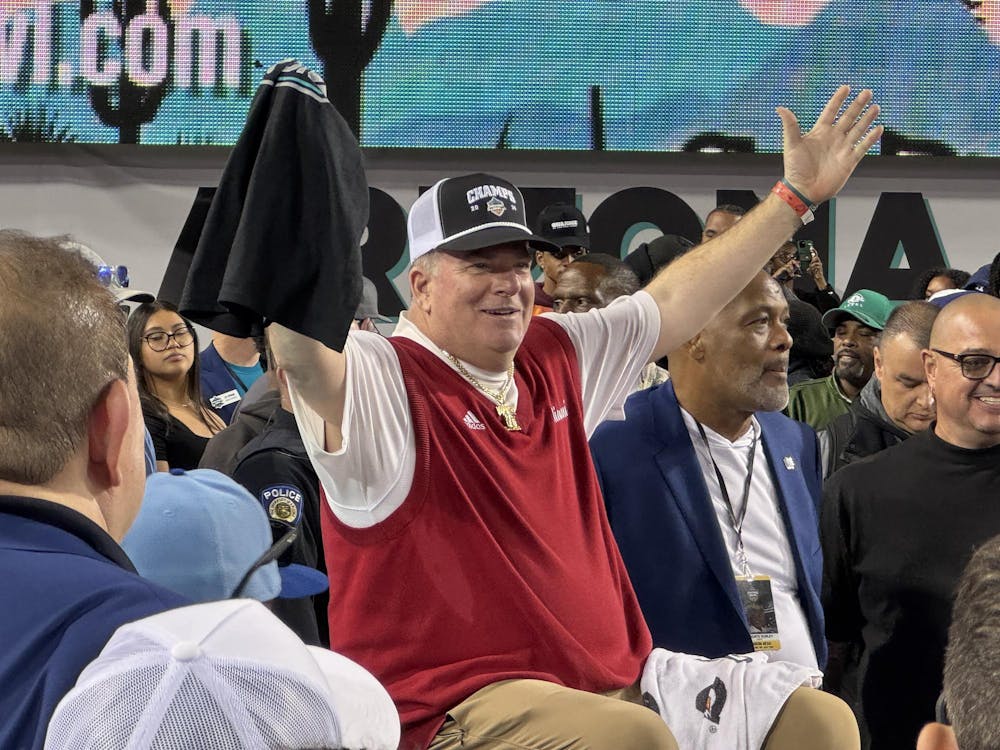Weekends in Oxford typically start Thursday night. It’s not uncommon to see a myriad of students dressed up walking across campus and Uptown on the penultimate day of the business week.
For senior public administration major Abbey Perkins, though, the weekend is restricted to Friday and Saturday. Thursdays are still a work day, and she needs to use all the time she can get to complete her applications.
Perkins is in the process of applying to graduate school for the 2022-2023 school year. She said her experience can be summed up in one word.
“It’s a fun little — what’s the best way I could say this — hell,” she said.
Perkins wants to be head administrator of a hospital one day. To get there, she’s applying to a variety of schools across the country, from East Coast New England to West Coast Seattle, for a master’s degree in public administration.
As she’s trekked through the journey of graduate school applications, Perkins has realized that while the process for undergraduate school applications was arduous, the pressure is incomparable to getting into a graduate program.
“I don’t know if you ever studied for the ACT or the SAT, but it’s like getting one of those big books and then having stakes 5o times larger than getting a good score on your ACT,” Perkins said. “It’s similar, but it’s also so different. It’s more of a serious process.”
While many graduate schools are doing away with the GRE, Perkins said her GPA needs the help of the standardized test score.
Perkins also said getting letters of recommendation at the collegiate level compared to getting them at the high school level are vastly different.
“For so many people, myself included, we’ve just been going to classes day in, day out and haven’t had time to really sit down and get to know some of these professors that we need to reach out to,” Perkins said. “It’s a scary, scary process.”
Perkins isn’t going through the process alone, though. To make sure her application is in top shape, Perkins used the Howe Writing Center to revise and edit her personal statement.
Shannon Seabolt, a senior biology and psychology double major, said she used the Center for Career Exploration and Success to polish her application and discuss her future.
Enjoy what you're reading?
Signup for our newsletter
Seabolt offered some honest advice to anyone considering applying to graduate school.
“It’s not something you can just save [until] the week before,” Seabolt said. “I would definitely say getting started early and pacing yourself is important.”
Danielle Hart, assistant director of the Career Center and liaison to the College of Arts and Science, emphasized that students should begin working on their applications before they think they need to and recommends starting the summer before senior year.
Hart encouraged students to take advantage of Career Center events targeted at assisting with graduate school applications, such as workshops on personal statements and resumes. She also said it’s beneficial for students to come in for individual appointments with their career advisor.
“[Graduate school] is a lot of work, and if students are going in without that love of doing it, or passion or reason for doing it, it may be detrimental,” Hart said. “So it's always something I try to gauge when I'm talking to students.”
In the present, Perkins’ focus is on finishing her academic career at Miami University strong. With the agency to have technology at her fingertips during class, though, Perkins finds it difficult to pay attention to her professors.
“I’m not even done with my application process, but I constantly am checking on [my applications] while I’m in class, and you know, it’s not the best route to take,” she said.
Perkins said the tendency of being distracted in class depends on the leniency of the professor — some are more understanding of students working on applications during class, while others will call them out for being preoccupied. But budgeting her time between classes, social life and studying for the GRE has proven to be a challenge for the fourth-year.
“It’s really not fun,” Perkins said. “It’s like a tug of war battle, and whoever wins that day gets my level of focus.”
For Seabolt, this balance means waking up at 8 a.m. for classes and work, then returning home around 6 p.m. to work on homework before 8 p.m. After 8 p.m., the school day is done — no more answering emails, no more writing papers. Even if something doesn’t get done, Seabolt keeps the evening hours open to wind down and relax with a movie or dinner with friends.
“I’m trying to be a little bit easier on myself and realize that I’ll take a B, and you know what? I had a really good semester.”
The key to success in academia, Seabolt said, is self-care.
“It’s definitely challenging to balance it all, but throughout all of it — school and applications,” she said, “it’s really important to put yourself first.”




